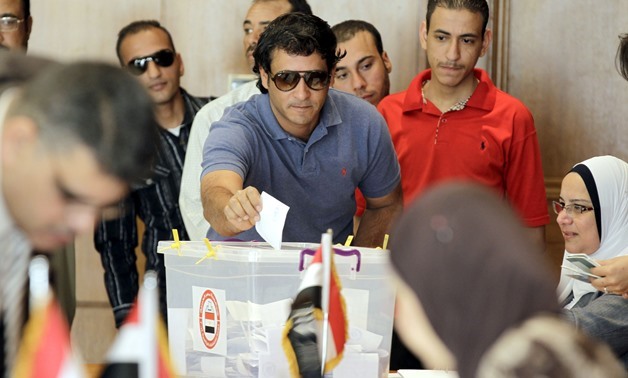
Egyptians living in Jordan cast their ballot in the early voting for the presidential elections on May 26-27, at the Egyptian embassy in Amman, on May 15, 2014 - AFP
CAIRO – 22 January 2017: A total of 850,000 endorsement forms have been signed by citizens for potential candidates, the National Election Authority (NEA) announced in a press release on Monday without giving a breakdown of the signatures, adding that it has not received any candidacy applications yet.
Sixty-eight NGOs applied to observe the 2018 presidential election.
are respectively 59 and 8.
Each potential candidate must be endorsed by either 20 parliament members or 250,000 citizens from a minimum of 15 different governorates.
The number of citizens eligible to vote in the presidential election taking place in March is 58 million; names can still be excluded or added as per legal guidelines.
The NEA announced the 2018 presidential election timetable on January 8. Potential candidates are allowed to submit their applications between January 20 and 29. The final list of candidates will be announced on February 24.
Voting will take place for three days, starting March 26 domestically, while it will begin on March 16 for expats from 9 a.m. to 9 p.m. in each country’s local time. The winning candidate will be announced on April 2.
According to Article 140 of the Egyptian constitution, electoral procedures should begin a minimum of 120 days before the end of the current presidential term, and the president-elect should be announced a minimum of 30 days before the end of the previous president’s term. The current presidential term will end in June 2018.
Electoral procedures consist of receiving and scrutinizing applications and appeals, as well as setting the electoral lists and campaign regulations.
The National Elections Authority is an independent institution running all types of elections and referenda in the country, currently chaired by Chancellor Lashin Ibrahim Mohamed, who also serves as vice-president of the Court of Cassation.
The NEA launched an official website for both the parliamentary and presidential elections. The new website aims to publish all the resolutions and recommendations pertaining to the elections, in addition to the voting guides for Egyptians inside and outside Egypt.
The NEA increased the number of judges supervising the 2018 presidential election to 17,000, matching the number of polling locations in the country as the number of eligible voters increased — and a judge must be present in each location to supervise the process.
The Ministry of Interior will be securing all polling locations and providing them with wheelchairs to help the elderly and disabled people.
Potential candidates who announced they would run for office are incumbent President Abdel Fatah al-Sisi, former Chief of Staff Sami Annan, rights lawyer Khaled Ali, and parliamentarian and President of Zamalek Sports Club Mortada Mansour.
Sisi is the sixth president of Egypt since it turned into a republic in 1952. He came to office in June 2014, beating socialist journalist Hamdeen Sabahi after the June 30 uprising that toppled former President Mohamed Morsi, a leader at the now-outlawed Muslim Brotherhood.
Annan and Mansour had declared they would run in the 2014 presidential election but did not. Ali ran against 12 candidates in the 2012 presidential election and came in seventh place in the first round, while the second round was only held among the top two, who were former Prime Minister Ahmed Shafik and Morsi.

Comments
Leave a Comment